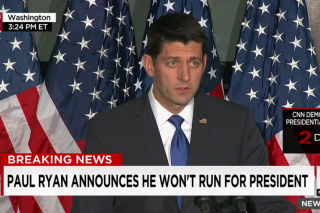 Phil Houston is CEO of QVerity, a training and consulting company specializing in detecting deception by employing a model he developed while at the Central Intelligence Agency. He has conducted thousands of interviews and interrogations for the CIA and other federal agencies. His colleague Don Tennant contributed to this report.
Phil Houston is CEO of QVerity, a training and consulting company specializing in detecting deception by employing a model he developed while at the Central Intelligence Agency. He has conducted thousands of interviews and interrogations for the CIA and other federal agencies. His colleague Don Tennant contributed to this report.
When Speaker of the House Paul Ryan on Tuesday declared categorically, “I do not want, nor will I accept, the nomination for our party,” he certainly seemed to be ruling himself out as the Republican nominee for President. But considering the other statements Ryan made, in practically the same breath, we are convinced his resolve is open to question.
Despite having made the dramatic, Johnson-esque, “I do not want, nor will I accept” declaration, Ryan appeared to build in just enough wiggle room to suggest he wants his party to know he can be swayed on the matter.
“If no candidate has a majority on the first ballot,” Ryan said, “I believe that you should only choose from a person who has actually participated in the primary.” There was very likely a reason that Ryan couched this statement, and a similar one toward the end of the press conference, in terms of simply being what he believes should be the case, as opposed to what absolutely must be the case.
It’s also noteworthy that Ryan said nothing to convey any sense that there’s no need for a white knight to come to the rescue of the Republican nomination. He failed to make any direct reference to the three remaining Republican candidates or their qualifications to be President. Instead, he took the opportunity for a thinly veiled attack.
“Politics today, it tends to drift toward personality contests, not policy contests,” he lamented. “Insults get ink more than ideas.”
If Ryan had truly and absolutely closed his mind to the prospect of becoming the Republican nominee, it seems likely that he would have made some effort to rationalize the legitimacy of the remaining three Republican candidates. He never even came close to doing so.
Even if we were to give Ryan the benefit of the doubt and assume that his true intent is indeed to rule himself out as the nominee, intent is a momentary phenomenon. It changes with the winds of circumstance.
We remember all too well Ryan’s declaration that despite all the encouragement, “I will not be a candidate” for Speaker of the House. When a reporter at the press conference pointed that out, Ryan gave the response he had likely prepared for a question he no doubt expected.
“Those are apples and oranges,” he said. “Being Speaker of the House is a far cry from being President of the United States, specifically because I was already in the House. I’m already a congressman. …That is entirely different from getting the nomination for President of the United States by your party, without even running for the job. So a completely non sequitur comparison, in my book.”
We find it extremely difficult to buy into that response. It may be tangerines and oranges, but it certainly isn’t apples and oranges. We have no reason to believe that Ryan wasn’t sincere when he bowed out of running for Speaker of the House. So even if Ryan’s true intention is to rule himself out as the Republican nominee for President, the precedent has been set. Given the extraordinary circumstances surrounding the Republican primary, intent may well prove to be even more fleeting this time around.